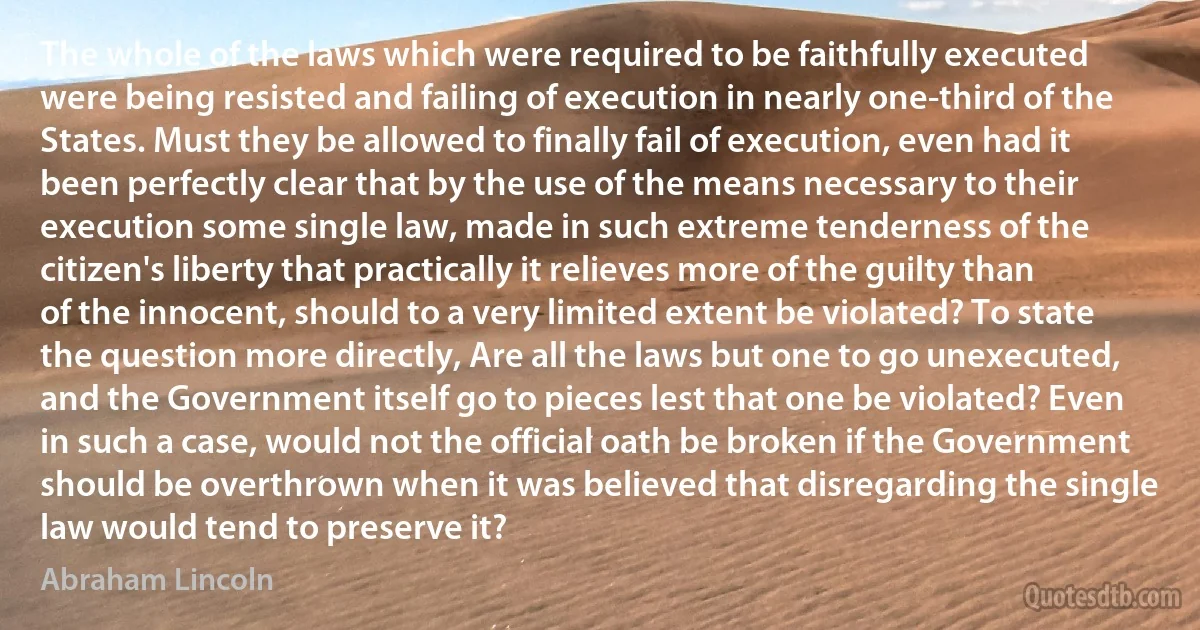
The whole of the laws which were required to be faithfully executed were being resisted and failing of execution in nearly one-third of the States. Must they be allowed to finally fail of execution, even had it been perfectly clear that by the use of the means necessary to their execution some single law, made in such extreme tenderness of the citizen's liberty that practically it relieves more of the guilty than of the innocent, should to a very limited extent be violated? To state the question more directly, Are all the laws but one to go unexecuted, and the Government itself go to pieces lest that one be violated? Even in such a case, would not the official oath be broken if the Government should be overthrown when it was believed that disregarding the single law would tend to preserve it?
Abraham LincolnRelated topics
case clear fail government guilty innocent law lest liberty limited necessary oath preserve question should single state use means laws one-third statesRelated quotes
Just as the commandment "Thou shalt not kill” sets a clear limit in order to safeguard the value of human life, today we also have to say "thou shalt not” to an economy of exclusion and inequality. Such an economy kills. How can it be that it is not a news item when an elderly homeless person dies of exposure, but it is news when the stock market loses two points? This is a case of exclusion. Can we continue to stand by when food is thrown away while people are starving? This is a case of inequality. Today everything comes under the laws of competition and the survival of the fittest, where the powerful feed upon the powerless. As a consequence, masses of people find themselves excluded and marginalized: without work, without possibilities, without any means of escape.

Pope Francis
Today's looting and acts of violence in Baltimore will not be tolerated. In response, I have put the Maryland National Guard on alert so they can be in position to deploy rapidly as needed. I strongly condemn the actions of the offenders who are engaged in direct attacks against innocent civilians, businesses and law enforcement officers. There is a significant difference between protesting and violence and those committing these acts will be prosecuted under the fullest extent of the law.My thoughts and prayers go out to the men and women in uniform who are actively working to stem this violence and several who been injured in the line of duty. These malicious attacks against law enforcement and local communities only betray the cause of peaceful citizens seeking answers and justice following the death of Freddie Gray.

Larry Hogan
I'm against these aggressive tax avoidance schemes but I'm not just against them, this Government has taken a huge amount of steps to legislate and toughen the laws and go after aggressive tax avoidance schemes for the very simple reason that if people go after these schemes and aggressively avoid tax they're making it the case that everyone else has to pay higher taxes as a result so I think we should be very clear, tax evasion is illegal and for that you can be prosecuted, you can go to prison for tax evasion. Tax avoidance is in these cases, very aggressive tax avoidance schemes, they are wrong and we should really persuade not to do them and that's why we have these court cases where the court looks at whether a scheme is really about avoiding tax rather than anything else and the court was very clear in this case.

David Cameron
What, then, is the Constitution? I will tell you. It is not even like the British Constitution, which is made up of enactments of Parliament, decisions of Courts, and the established usages of the Government. The American Constitution is a written instrument full and complete in itself. No Court in America, no Congress, no President, can add a single word thereto, or take a single word threreto. It is a great national enactment done by the people, and can only be altered, amended, or added to by the people. I am careful to make this statement here; in America it would not be necessary. It would not be necessary here if my assailant had shown the same desire to be set before you the simple truth, which he manifested to make out a good case for himself and friends.

Frederick Douglass
Labor is a commodity, like any other, and its price is therefore determined by exactly the same laws that apply to other commodities. In a regime of big industry or of free competition – as we shall see, the two come to the same thing – the price of a commodity is, on the average, always equal to its cost of production. Hence, the price of labor is also equal to the cost of production of labor. But, the costs of production of labor consist of precisely the quantity of means of subsistence necessary to enable the worker to continue working, and to prevent the working class from dying out. The worker will therefore get no more for his labor than is necessary for this purpose; the price of labor, or the wage, will, in other words, be the lowest, the minimum, required for the maintenance of life.

Friedrich Engels
